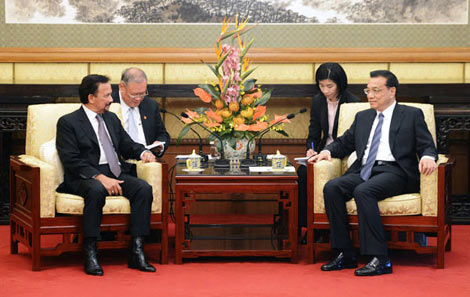
Despite the increase in grain output and the incomes of rural villagers for nine consecutive years, long-term and sustainable agricultural production and improving the quality of villagers' livelihoods is still a hard nut to crack.
The No 1 document the Party's central leadership issued on Thursday stresses that efforts will focus on accelerating the modernization of agricultural production and management organizations.
This is because more than 260 million middle-aged and young villagers have migrated to work in cities and the rising agricultural production momentum will not be maintained unless production is well organized. So the document says that subsidies for agriculture must be tilted toward big specialized households, family farms and rural cooperatives, which are the future of the country's agriculture.
On the question of the transfer of land use rights, the document says that transfer of the right to use contracted land should be encouraged but never coerced. This refers to the transfer of land use rights for agricultural production. Local governments, county and township governments in particular, should not take it as a green light to expropriate rural land for non-agricultural purposes.
Those villagers who have moved to cities should not leave their land idle. If they are willing to, they can transfer the right to use their land to family farms or rural cooperatives. Only in this way will China's agriculture be modernized and its food security be safeguarded.
The country's goal is building a moderately well-off society by 2020. If agriculture, rural areas and villagers are where the most efforts are needed, local governments' correct understanding of the central authorities' policies and their effective implementation of them are necessary.
That most violent conflicts in rural areas are related to the acquisition of rural land points to some local governments' lack of concern for the protection of villagers' rights and interests. Some even do whatever they can to grab the interests of villagers.
Nothing should be allowed to undermine agricultural production, and everything possible should be done to increase the incomes of villagers and improve the quality of their lives.
When the central authorities' rural policy is implemented around this, villagers will undoubtedly benefit, agriculture boom and rural development add to the prosperity of the entire nation rather than become a drag on its modernization.
 'Cat model' to dazzle Shanghai auto show 2013
'Cat model' to dazzle Shanghai auto show 2013
 Models at Tokyo modified car show
Models at Tokyo modified car show
 Shanghai Fashion Week focuses on domestic brands
Shanghai Fashion Week focuses on domestic brands
 Angel-dress models at Shandong auto show
Angel-dress models at Shandong auto show
 Safe and Sound
Safe and Sound
 Theater firms scramble for managers
Theater firms scramble for managers
 Premier pledges closer ties with Brunei
Premier pledges closer ties with Brunei
 Volkswagen's all-new GTI at New York auto show
Volkswagen's all-new GTI at New York auto show